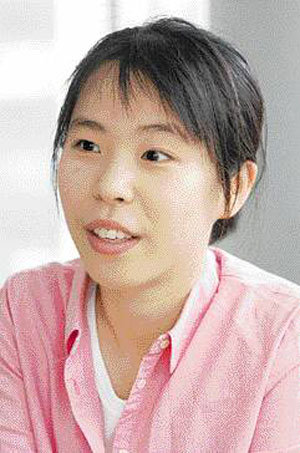Wounded Souls Hiding in Caves

When you have no social obligation, no experience or memory that you treasure or enrages you to express in your literature, what is a novelist to write about? Kim Mi-wol (30) provides an answer in her collection of novels, A Guide to the Caves of Seoul (Moonji Publishing). She is a newcomer to the writing world who has been critically acclaimed for her profound critical mind and well-written novels.
Kim was born and grew up in a happy middle-class family, and went to college in an age where it was no longer an obligation to be socially conscious. She did not have something crucial to write about, but she dreamt of becoming a novelist anyway. A Guide to the Caves of Seoul is the first realization of her dreams.
The short story titled Knuckles is about a narrator who works a part-time job in an Internet café. Her mother bore her out of wedlock and committed suicide, and the narrator lives with her senile grandmother. However, when she is submerged in role-playing games, she is able to escape a troublesome reality. In the title piece, A Guide to the Caves of Seoul, the narrator works in the artificial caves of Seoul, and carries the scar of having lost his mother in childhood through an accident. From the next-door room of the narrators room in a gosiwon (a building of small rooms with minimum space for a bed and desk where people stay for cheap lodging or studying), moaning sounds are emitted every night, but they turn out to be coming from a video. This is not all. There is Jong-gu, who has enough to cope with as it is after the death of his parents, but who has to take care of his step-brother as well (Happy Day, Inc.), and Gi-hwan, who has to accept a next door neighbor who used to sexually molest him as his step-father (Back Room). Most of the characters in the novellas are people who have been hurt by their family. They choose fake realities (such as artificial caves or computer games) in order to hide from their painful reality.
Kim was loved by her parents as a child, unlike the characters in the novel. Then one day, she realized that people who seem bright and cheerful all have problems of their own. Although she claims that she only added imagination to such problems to create stories, her novellas symbolize loners in individual paradises (Lee Gwang-ho, literary critic), the dark underside of the modern age.
kimjy@donga.com




![“잠만 자면 입이 바싹바싹”…잠들기 전에 이것 체크해야 [알쓸톡]](https://dimg.donga.com/c/138/175/90/1/wps/NEWS/IMAGE/2026/02/23/133404749.3.jpg)


